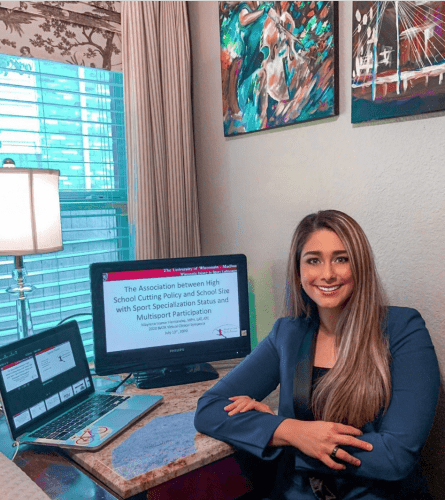Grad student’s research focuses on ‘cutting’ from sports teams
When high schools cut athletes from sports teams, it can be painful for those who didn’t make the team.
But it also has wider implications, according to research from UW kinesiology graduate student Mayrena Hernandez. Larger schools seem to cut more athletes than smaller schools, she found, which led female high school volleyball athletes to specialize in their sport, focusing on it year-round instead of playing multiple sports.

Mayrena Hernandez Submitted photo
“My research showed that female high school volleyball athletes from schools that cut/larger schools were more likely to be highly specialized, participate in club volleyball, summer volleyball camps, summer college camps, and be a single sport athlete,” she said.
Seeing that female athletes are more likely to specialize was something that concerned Hernandez.
“I am worried about specialization due to the previous research that current exists showing high rates of specialization lead to overuse injuries. I also believe the culture of sport has significantly shifted to ‘pay to play’ which ends up excluding many low income, low access athletes from participating in sport,” she said.
Hernandez’s research was selected to be presented at the National Athletic Trainers’ Association symposia that allows labs and students to present their research and projects to an audience.
All of Hernandez’s research was from a larger data set. Through this large data set she was able to collect information for the variable of the cutting policy, using a sample of 2,216 female high school volleyball athletes and 83 schools across the state of Wisconsin.
Having Dr. David Bell as a mentor has been a big help for Hernandez and her research. “Dr. David Bell is one of the leading researchers in the sports medicine field in sports specialization,” she said.
With COVID-19 taking the world the by storm, Hernandez was not sure if she was even going to be able to present her research at all. Thankfully the symposia was shifted to an online platform.
“Even with all the technical difficulties that come with presenting virtually, it went really well and I think it was easier than when you present in person,” she said.
After Hernandez presented her research a recorded video or her presentation was posted to the symposia’s website where a live chat box was open for the audience to send comments and questions and Hernandez was able to interact with them.
https://www.instagram.com/p/CClsYdYjXCh/?utm_source=ig_web_copy_link
“I was there in the live chat box able to answer any questions that anyone had about my research which was nice to do,” she said.
Hernandez is very proud of her lab and all the hard work everyone put in.
“I want to shout out the Wisconsin Injury and Sports Lab and David Bell. They are a great lab to work with and I love UW. It has been a great university to attend the last two years,” she said.
She credits her interest in sport and physical activity research to the positive impact it can have in someone’s life. She discovered a love for marathons and ironman triathlons in her undergraduate years.
“I am going into sport research, or more like research on any physically active population because I believe physical activity is so important and brings many positive aspects to a person’s quality of life,” she said.
Ultimately Hernandez hopes her research can have a positive and lasting effect.
“I want my research and athletic training career to contribute to introducing, participating, or bringing back physical activity in a safe way.”
Tags: graduate students, research, students




